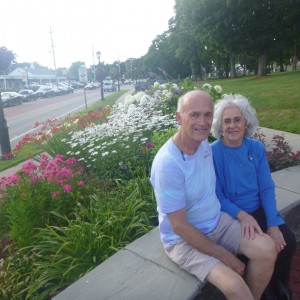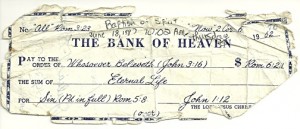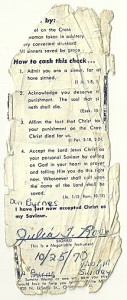By Judith Ryder
Luke 11:13 “If ye then, being evil, know how to give good gifts unto your children: how much more shall your heavenly Father give the Holy Spirit to them that ask him?”
[Preface: “Hound of Heaven”, a Christian poem by English poet Francis Thompson, published in 1893, was originally considered bold and puzzling, but later became precious to many. The Neumann Press Book of Verse (1988) explains: “…As the hound follows the hare, never ceasing its running, ever drawing nearer in the chase, with unhurrying and imperturbed pace, so does God follow the fleeing soul by His Divine Grace. And though in sin or in human love, away from God it seeks to hide itself, Divine Grace follows after, unwearyingly follows ever after, till the soul feels its pressure, forcing it to turn to Him alone in that never ending pursuit.”]
Devout Roman Catholics of Portuguese descent, Rose and Antonio Rosa lost one child in infancy, and reared six. Julia was second to the youngest. Growing up in Middletown, RI, Julia remembers thinking she wasn’t very special compared to her brothers and sisters. Her three sisters were either extremely smart, popular or cute, and her two brothers were either smart or movie-star handsome. But as for herself, Julia thought, “Jesus loves me”. Unusually pious, Julia loved Him back with all her heart.
Six weeks into her junior year at Rogers High School in Newport (Middletown had no high school then), her school bus passed a Catholic school with a statue of Mary in the window. Julia asked the bus driver to let her out. She immediately enrolled in St. Catherine School for Girls in Newport. Although the school was strict, Julia didn’t mind. Nicknamed “The Holy One”, she was used to praying the rosary nightly on her knees with her family. While at St. Catherine’s, some of her good Catholic friends became pregnant out of wedlock. Although she dated and went to parties and dances, too, this profoundly disturbed Julia, and she was determined not to end up like them. Entering a convent had never occurred to her, so when two of her friends asked her to accompany them on a vacation to a convent, she had no desire to go. But when another friend got pregnant, Julia began to consider joining a convent not only because she wanted to keep pure, but also because she truly loved the Lord and hoped, above all, to become a saint like her idol, Saint Teresa.
However, before entering a convent, Julia spent one semester at Salve Regina, but after realizing the work was too hard for someone who hated reading and had slow comprehension, she quit. (Subsequently hearing about a book teaching speed-reading, she read it and embarked upon a lifetime of reading fast.) She also worked 1 ½ years for the telephone company. Then, just one month short of her twenty-first birthday, Julia entered Corpus Christi Carmelite Order of Nuns (CCC) for six months of probation as a postulant and two years as a novice, before becoming a professed nun. She learned that after entering she could never go home again unless a parent died, but could have visitors once a month during the next 2 ½ years. Despite weeping copiously as she said goodbye to her parents, Julia’s experience at CCC was superb. She loved everything – classes, prayers, following the rules to a “T”, even the hard work done in three-month job rotations: cooking, laundry, cleaning buildings, bathrooms, and taking care of the chapel. She purposed to be the best saint ever, and enjoyed a wonderful unity with the other girls. After 2 ½ years of training, she made her “First Vow” of poverty, chastity, and obedience. Now a professed nun, she took the name Sister Rose Anthony in honor of the beloved saints for whom her parents were named.
Next Julia was sent to Corpus Christi Carmelite in Newport where she wrote mass cards (“spiritual bouquets”) in calligraphy with gold ink. The priests would say daily masses for souls in Purgatory. They cost varying amounts for a month or year of masses, and more for perpetual prayers. Julia also did chores and took more courses at Salve Regina. When she was 25, she had a vivid dream in which she saw Jesus standing with His arms out. She was excited, thinking she was going to Heaven, but He said, “Not now.” She told the other nuns but, being hard-core, down-to-earth workers, they were not into “nonsense”. They made everyone work very hard and pray from 5:15 a. m. to 10:00 p. m., with two hours for recreation, including sewing and teatime. Once on her weekly day off, Julia heard Boston street preachers banging on Bibles and giving the Gospel. She thought, “They don’t understand that they need to belong to the Catholic Church – they’re misguided.”
After 1 ½ years at the Newport convent, Julia was sent to a convent in Scottsbluff, Nebraska to teach catechism to Mexican children. Her duties included day care and working with troubled children. Across the street was Hiram Scott College; a young man from there came over often to help. One night, her Superior asked Julia to go with him to teach. On the way home, he wanted a hamburger. She told the Superior about it later, and was excoriated for going with him. Julia had no ulterior motives but was very naïve. Once Julia was asked to take a troubled teen to the hospital to visit her father. A man stopped her on the way and said, “You Catholics think you’re going to heaven because you’re good, but to get to heaven you need Christ to pay for your sins.” Julia returned and told her Superior, who assured her, “He doesn’t know; he’s not Catholic.” The troubled teen girl remarked, “You’d do better outside a convent – you could help more people and not be tied down.” Julia stayed extremely busy at the convent. After awakening at 5:00 a. m., she meditated for ½ hour, went to mass for an hour, then matins (during which she chanted out loud the Divine Office in Latin, and later in English), all before work. After about 1 ½ years, it was time to renew her vows, this time for two years. Following that, she planned to take her Final Vows.
Incredibly, the very day before she was to renew her vows, and “out of the blue”, she distinctly perceived the Holy Spirit telling her to come out of the Order and do Christ’s work elsewhere. This totally shocked and amazed her because she had been as happy as a lark. Confused, she told both her Superior and the Mother General who oversaw the Order of the Carmelites. The Mother General advised Julia to renew her vows for just one year so she could discern whether the Lord really wanted her out. But Julia believed she should obey the Holy Spirit and leave without taking any vows. This was difficult since she was sacristan, in charge of the chapel and lighting the candles for the vows ceremony. Her Mother Superior did not interfere, but graciously offered her money for clothes and a plane ticket home. However, Julia said she preferred to get a place in town and help poor people, or discover what the Lord wanted her to do. The Mother Superior replied she would have to go home, as it was the convent’s obligation to return her, but she could always come back to the area if she wished. It was February 1968, and Julia left the convent at age twenty-seven, almost six years after entering.
Wanting time to think on the way home, Julia opted for traveling 3½ days on a bus instead of flying. The Carmelites covered the cost. (When she entered the Carmelites, she was required to give a $900 dowry to be kept until her Final Vows). As she settled into her bus seat, the man beside her asked, “Where have you come from?” She whispered, apparently unclearly, “I was in the convent”. He replied, “Don’t feel bad, I’m an ex-convict, too”… Upon arriving home, she found her parents disappointed in her decision; they had been proud of her profession. For the next 1½ years, she worked at a nursing home and as a dietary aide at Newport Hospital to pay back her father for the dowry. She also helped the priests at her church with budget envelopes, teaching CCD classes, working in the CYO, and taking Catholic doctrine classes at the Catholic Information Center. Julia was serious about vows. She remembers telling a priest she wanted to take a vow of chastity, but he recommended just letting the Lord lead.
Meanwhile, Julia moved from her parents’ home to a Newport rooming house where her comings and goings wouldn’t disturb them. Nearby was a Servicemen’s Christian Center (SCC), a temporary home for Navy men who preferred not to live on the ship, and a place where everyone was welcome to attend Bible studies. These men did a lot of witnessing in town. A born-again Christian soon moved into Julia’s rooming house and began seriously witnessing to her while she defended the Catholic Church. He told her that all she needed was Christ, and introduced her to the SSC, where she met many who sincerely loved the Lord. There was definitely something different about those men: they backed up whatever they said with Scripture, which deeply impressed Julia. Still she thought, “Catholics believe the Bible, too,” so resisted changing religions, believing Catholicism was the only true religion.
After 1½ months attending SCC’s Bible studies and being shown Scriptures, Julia was approached by a Navy man who said, “You need to be born again and trust Christ alone as your Savior — not the Church, not your good works, but Christ alone. He paid for your sins and that’s the only way to get to heaven.” One night he took her into a private room, where Julia struggled mightily with the difficulty of making a decision. After all, everything she had ever believed in revolved around the Catholic Church: Baptism, Holy Communion, Confirmation, Marriage, Death, and Catholic Feasts. It would be like a total divorce. But at last she trusted Christ. Immediately the veil was lifted from her eyes, and she knew that if she died she would go straight to Heaven, not to Purgatory for millions of years until purified. She signed a little check-like paper from the “Bank of Heaven”. It remains in her wallet 44 years later, tattered and aged, but reminds her of what happened that night. It reads, “Date: 10/25/70, 11:00 p. m. Sunday night”; “Pay to the order of: Whosoever Believeth (John 3:16)”; “$: Romans 6:23”; “The Sum of: Eternal Life”; “For: Sin (pd. in full) Romans 5:8”. The signature line reads “John 1:12” on top, and underneath, “The Lord Jesus Christ”.
Since she hadn’t freely chosen Christ previously, she was encouraged to be baptized, so on 10/28/70 she was immersed at King’s Park in Newport, by Roy Blevins, the man at her rooming house who had first witnessed to her (who now preaches in ME.) At the SCC, Julia repeatedly heard the name of Jack Humble. The men there often prayed for him; he used to live there, had gone out to sea, and would be returning soon. Jack was a Navy chief, twenty-nine years old, like Julia, and before long they began dating, reading the Bible, memorizing Scripture together, and married several months later in June, 1971. Their first child was born the day before their first anniversary. By age 39, the Humbles had seven children, including twins. Julia was so busy with seven home-schooled children that she didn’t make much private time with the Lord, so after the children were grown she found herself feeling frazzled and drained.
Searching for the “victorious Christian life”, she ran across V. Raymond Edman’s They Found the Secret, which she read again and again. Edman explained how he found the Holy Spirit through Luke 11:13: “…how much more will the heavenly father give the Holy Spirit to them that ask him?” Julia figured that if you ask the Lord to be your Savior, He will, so if you ask the Holy Spirit to be your personal Teacher, Comforter, Guide, and Power, He will. All the people cited in Edman’s book found the Holy Spirit empowered them for living and serving in “the exchanged life”. Although knowing the Holy Spirit was inside, Julia realized that heretofore she had thought almost solely about Jesus. The Holy Spirit now began a work in her that ultimately changed her life, showing her that the words in the Bible are her Father’s words, and He would always back them up. He taught her how to live the Word twenty-four hours a day if she was willing to be led by Him and abide in Christ. She says her biggest challenge is to “love even as Christ loves.” But because God’s love was poured forth into her heart by the Holy Spirit, she rejoices in her ability to grow in that love. Julia says, “Christ has become my all in all, for apart from Him there is nothing to brag about, and He should always receive all the glory.”










